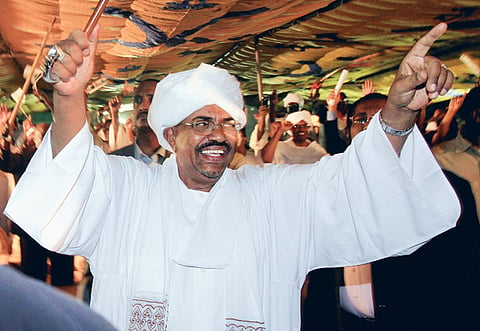Issues of national stability remain after Al Bashir win
Darfur conflict and 2011 vote in the South lie ahead

Khartoum: President Omar Al Bashir has won the first democratic Sudan election in 24 years, closing a chapter on his 22 years as the country's military ruler and potentially opening the way to new legitimacy as a democratically elected leader.
Al Bashir won 68 per cent of the vote, Sudan's National Election Commission announced on Monday.
His closest competition was Yasir Arman, a member of the southern-based Sudanese People's Liberation Movement, who withdrew from the race in the final week over concerns about fraud, but still garnered 21 per cent of the vote.
In a concurrent election in the semi-autonomous region of South Sudan, SPLM leader Salva Kiir won as that region's president with 92.9 per cent of the vote.
Irregularities
Foreign and local observers noted serious irregularities in the polling, including the buying of votes and the intimidation of opponents, but the elections were largely free of violence.
Still, the most crucial moments in the nation's stability lie ahead, with political reconciliation in the war-torn Darfur region and the possible division of oil resources if the South votes to secede in a 2011 referendum.
"The focus now should be for Sudanese political forces to find a way of achieving political stability," said Fouad Hikmat, a Sudan expert at the International Crisis Group, based in Nairobi. "The issues this government will face are going to be the same as those faced by the previous government."
"If Al Bashir can push for an agenda of peace in Darfur, rather than an agenda of military defeat of the armed groups, if he can bring an element of stability in the border regions of South Kordofan and the Blue Nile state, and if he can implement the full Comprehensive Peace Agreement with the south, then there is a chance for peace," Hikmat said.
Many African leaders welcomed the results since they signalled a formal end to the power struggle between north and south.
Can the President bargain with international court?
Khartoum: Al Bashir's election win served a personal goal as well. He was indicted last year by the International Criminal Court (ICC) in The Hague for war crimes and crimes against humanity, and Al Bashir's supporters hope that his election and his continued support of peace with the south and with the restive Darfur region will give him some bargaining power to delay or cancel any future ICC war crimes trial.
It is for this reason that human rights activists are most critical about these elections, calling them a sham, despite the Sudanese election commission's apparently state-of-the-art methods for preventing ballot box stuffing.
"This election was decided over the last year, as the census was fixed, the voter registration was fixed, the drawing of voting districts was fixed, and the composition of the electoral commission was fixed," said John Prendergast, co-founder of the Enough Project, an anti-genocide group based in Washington.
— Christian Science Monitor
Sign up for the Daily Briefing
Get the latest news and updates straight to your inbox



